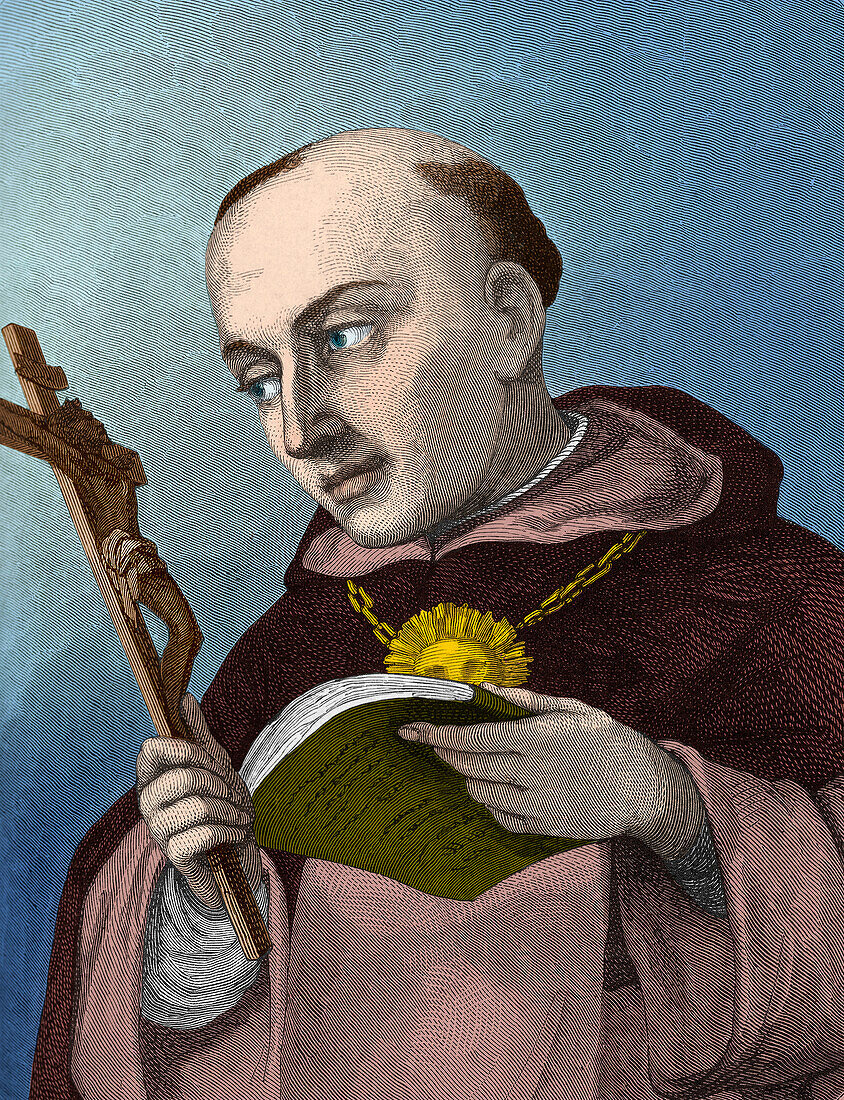Thomas Aquinas, Italian philosopher
Bildnummer 13501835

| Thomas Aquinas (January 28, 1225 - March 7, 1274) was an Italian Dominican friar and priest and an influential philosopher and theologian in the tradition of scholasticism, within which he is also known as the 'Doctor Angelicus' and 'Doctor Communis'. He was the foremost classical proponent of natural theology, and the father of Thomism. His influence on Western thought is considerable, and much of modern philosophy was conceived in development or opposition of his ideas, particularly in the areas of ethics, natural law, metaphysics, and political theory. He embraced several ideas put forward by Aristotle and attempted to synthesize Aristotelian philosophy with the principles of Christianity. The works for which he is best known are the Summa Theologica and the Summa contra Gentiles. Thomas is honoured as a saint by the Catholic Church and is held to be the model teacher for those studying for the priesthood, and indeed the highest expression of both natural reason and speculative theology. As a Doctor of the Church, Thomas is considered the Church's greatest theologian and philosopher. He died in 1274 while giving commentary on the Song of Songs. Illustration from Vies Des Savants Illustrates, Savants Du Moyen-Age by Louis Figuier, 1883. This image has been colour enhanced. | |
| Lizenzart: | Lizenzpflichtig |
| Credit: | Science Photo Library / Science Source |
| Bildgröße: | 3693 px × 4816 px |
| Modell-Rechte: | nicht erforderlich |
| Eigentums-Rechte: | nicht erforderlich |
| Restrictions: | - |
Preise für dieses Bild ab 15 €
Universitäten & Organisationen
(Informationsmaterial Digital, Informationsmaterial Print, Lehrmaterial Digital etc.)
ab 15 €
Redaktionell
(Bücher, Bücher: Sach- und Fachliteratur, Digitale Medien (redaktionell) etc.)
ab 30 €
Werbung
(Anzeigen, Aussenwerbung, Digitale Medien, Fernsehwerbung, Karten, Werbemittel, Zeitschriften etc.)
ab 55 €
Handelsprodukte
(bedruckte Textilie, Kalender, Postkarte, Grußkarte, Verpackung etc.)
ab 75 €
Pauschalpreise
Rechtepakete für die unbeschränkte Bildnutzung in Print oder Online
ab 495 €
Keywords
- 13. Jahrhundert,
- berühmt,
- christlich,
- eingefärbt,
- Europa,
- farbig,
- Farbverbesserung,
- figuier,
- gefärbt,
- Geschichte,
- Gravur,
- Illustration,
- Italien,
- katholisch,
- Kunstwerk,
- Louis Figuier,
- Mann,
- Männlich,
- Mittelalterlich,
- Mönch,
- natürliche Theologie,
- Niemand,
- Person,
- Philosoph,
- Philosophie,
- Porträt,
- Priester,
- Religion,
- Theologie,
- verbessert
